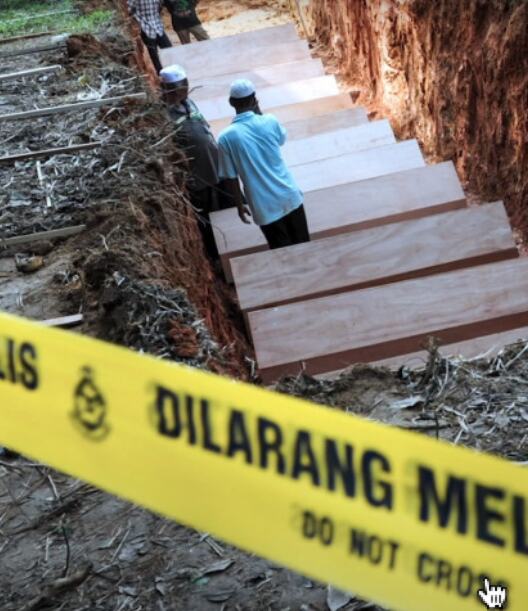Charged Thai Nationals Extradited to Malaysia for Rohingya Human Trafficking
Four Thai nationals were charged in Malaysia on Friday for human trafficking offenses in connection with the 2015 discovery of mass graves believed to be of Rohingya Muslims and Bangladeshis in a hilly jungle area on the country’s border with Thailand. The four men were extradited to Malaysia on Thursday.
Four Thai nationals were charged in Malaysia on Friday for human trafficking offenses in connection with the 2015 discovery of mass graves believed to be of Rohingya Muslims and Bangladeshis in a hilly jungle area on the country’s border with Thailand. The four men were extradited to Malaysia on Thursday and escorted by police to a lower court in the northern Perlis state, where they were charged with trafficking two Myanmar nationals. In May 2015, Malaysian police announced the discovery of abandoned camps used by human smugglers in Wang Kelian, and later exhumed 139 bodies from mass graves there.
These findings followed a similar discovery on the Thai side of the border, where police unearthed 36 bodies from shallow graves. Most of those who were held captive by the trafficking networks were Rohingya Muslims and impoverished migrants from Bangladesh, trying to find a better life. The men were charged with up to 15 years imprisonment if convicted. No pleas were entered and they were denied bail. Their case will be transferred to the high court for hearing. Malaysia has already charged five foreigners with trafficking-related offenses in connection with the Wang Kelian camps, while Thailand convicted 62 people, including nine Thai officials, of trafficking crimes.
A joint report by the Human Rights Commission of Malaysia and Fortify Rights found gaps in the investigation and possible obstruction of justice. The Royal Commission of Inquiry set up by the government later said no Malaysian enforcement officials, public servants or local citizens were involved in the trafficking syndicates, but found negligence by border patrols for failing to follow standard operating procedures that hindered the investigation.




